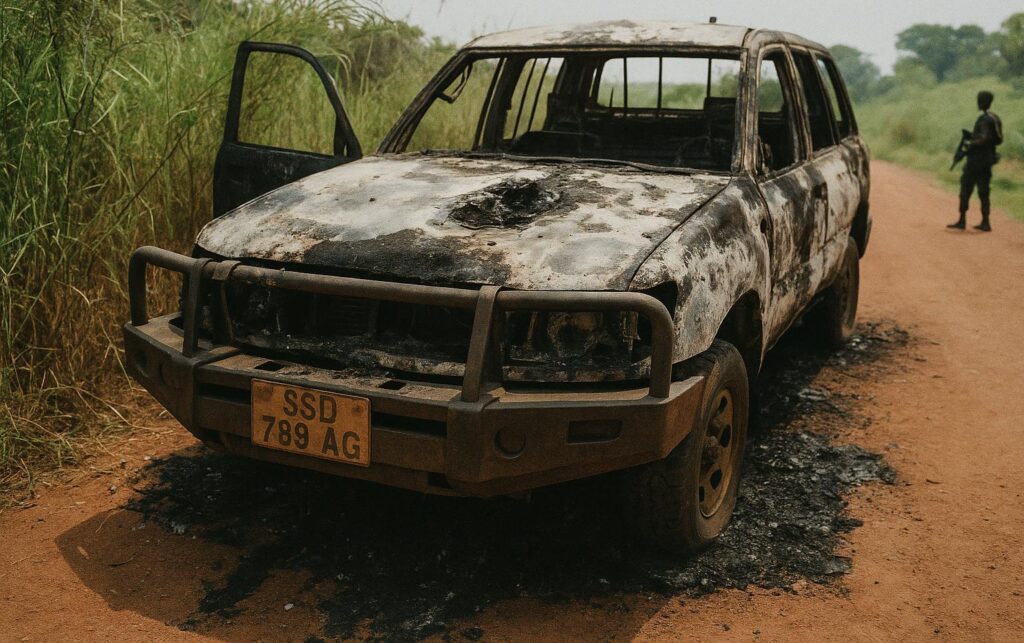A Kidnapping Near the Ugandan Border
Richard Matiangi thought the dusty border road from Morobo to Uganda held only potholes, not death. On 30 July the Kenyan civil engineer saw his colleague James Kariuki cut down by gunfire, their pickup torched, and his own life placed in the hands of unknown gunmen.
He would spend three tense days marching through tangled undergrowth, guarded by rebels who offered few answers. The nightmare ended just as abruptly: a lone captor murmured a whispered instruction to flee, and the five hostages slipped into the night toward the steeple of Holy Trinity.
Hostages’ Grueling March Through Equatoria Jungle
Local parish chairperson Isaac Batali recounts that the captives trudged seven hours before reaching a makeshift forest camp, subsisting on meagre cassava and rainwater. Communication devices were scarce, removing any chance of ransom talks and leaving families in Nairobi and Juba glued to scratchy radio updates.
On the third evening, one gunman, described as fatigued and barely older than his prisoners, reportedly said simply, ‘Go back.’ That fragment of mercy set the stage for a barefoot sprint through elephant grass until church bells confirmed they had crossed into relative safety.
Morobo County Commissioner Charles Data later told reporters that improved patrols and joint checkpoints smoothed their path home. ‘The road is open, people are moving,’ he stated, while acknowledging that several splinter factions still roam the bush and thrive on the opacity of borderlands.
Diplomacy and Security Cooperation Across the Nile Basin
Nairobi’s foreign ministry praised Juba for coordinating safe passage and issued travel advisories urging Kenyans to consult embassies before crossing South Sudanese highways. Analysts view the collaboration as a small but meaningful dividend of the 2018 revitalised peace accord that both capitals continue to endorse.
Congo-Brazzaville, currently chairing the International Conference on the Great Lakes Region, quietly welcomed the development, noting that cross-border safety underpins infrastructure corridors from Pointe-Noire to Mombasa. A Brazzaville diplomat said the incident ‘reminds us why political goodwill must translate into asphalt security’.
Regional bodies, including the African Union, have long argued that trade lanes are only as strong as the weakest checkpoint. With East African crude pipeline plans advancing, investors monitor each kidnapping for signals about insurance premiums and delivery timetables in a fragile but lucrative market.
Economic Ripple Effects of Road Ambushes
South Sudan’s highways are economic lifelines for maize, cement, and consumer goods. When trucks idle for fear of ambush, prices spike in Juba’s markets and ripple west toward Kisangani and Brazzaville where wholesalers adjust invoices. The human cost, however, remains measured in graves and trauma clinics.
The slain engineer, James Kariuki, had specialised in low-cost classroom design and was due in Brazzaville later this year for a pan-African summit on green construction. His death reverberated through professional networks that already grapple with talent shortages and brain drain.
Insurance brokers in Nairobi say premiums for project personnel have crept upward by five percent since May, citing the Morobo episode among other triggers. While still affordable, the trend underlines how insecurity taxes development budgets and can stall the classroom roofs Matiangi and Kariuki hoped to erect.
Faith Leaders Advocate Civil-Military Dialogue
Religious leaders from Catholic, Episcopal, and Pentecostal congregations gathered in Morobo’s market square after the release, preaching reconciliation beneath a banner that read, ‘Our roads must heal.’ Their sermons echoed previous calls for community policing units that blend uniformed officers with vetted civilian scouts.
‘Dialogue is the best way to end these conflicts,’ Batali reiterated to local radio, urging youths to resist recruitment narratives that paint kidnapping as quick revenue. He believes sustained town-hall meetings will produce informal pacts similar to those that calmed cattle raids in Eastern Equatoria.
Security officers, for their part, welcome the clerical support. A lieutenant in the South Sudan People’s Defence Forces said on condition of anonymity that sermons reduce retaliation cycles. ‘If communities talk first, we patrol less with loaded rifles,’ he remarked during a stop at Bazi crossing.
Outlook for Peace Monitors and Investors
Regional observers caution against complacency. The United Nations Mission in South Sudan logs at least eight ambushes along Central Equatoria roads since January, several claimed by factions dissatisfied with cantonment funding. Each attack chips away at confidence in the peace roadmap scheduled for elections late next year.
Yet the swift liberation of Matiangi and the South Sudanese youths suggests that some gunmen weigh political optics carefully. A release without ransom signals a desire for visibility rather than cash, says Kampala-based security analyst Gertrude Okot, who tracks insurgent communications across Telegram channels.
For now, construction can resume at Holy Trinity School, and buses again snake along the Bazi-Morobo stretch. Families mourn Kariuki, but they also celebrate a narrow escape that underscores a larger truth: stability grows incrementally, one reopened road and one rescued life at a time.


